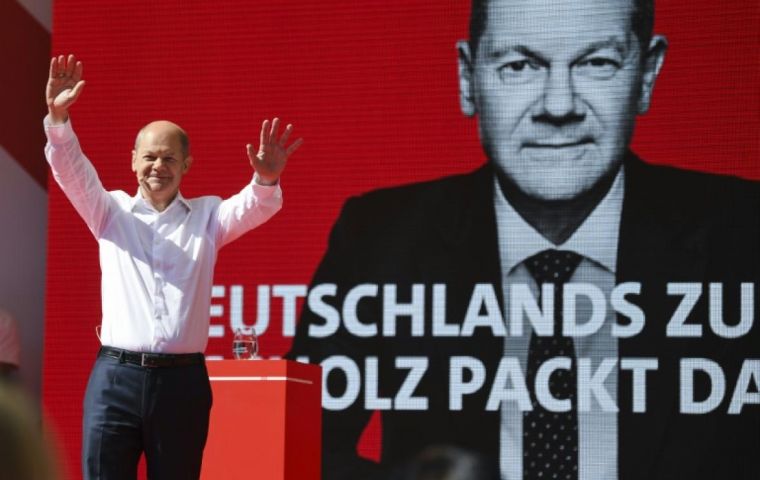MercoPress. South Atlantic News Agency
Germany's future Chancellor still a mystery after close elections with SPD slightly ahead
 Incumbent vice-chanellor Scholz is open to coalitions with anyone, except far left and far right parties
Incumbent vice-chanellor Scholz is open to coalitions with anyone, except far left and far right parties After German Chancellor Angela Merkel decided to retire, the formation of a new government is far from clear following Sunday's elections.
Although the Social Democratic Party of Germany (SPD) received 206 out of 735 Bundestag (Parliament) seats against 196 for Merkel's Christian Democratic Union and Christian Social Union (CDU/CSU) bloc, according to preliminary data, it is far from clear who will succeed her as head of government.
Brokering a coalition with other political forces may not be easy. The Greens got 118 seats, the Free Democratic Party 92, the Alternative for Germany 83, and the Left 39.
For the Conservative CDU/CSU alliance, Sunday's results slightly above 24% were the worst result for them in history, while projections by public broadcasters ARD and ZDF showed that SPD candidate Olaf Scholz had received between 24.9 and 25.6 % of the votes. The Christian Democratic Union (CDU) and Christian Social Union (CSU) coalition had raked in between 24.4 and 24.7 %.
With these results, both parties believe that they could lead the new federal government.
Scholz, who is also the incumbent vice-chancellor and finance minister, received long-time applause from his party on his first public appearance at the SPD's headquarters in Berlin after projections were released. “I'm happy to see so many here and of course I'm happy about the election result ... Many citizens want that the next Chancellor is Olaf Scholz,” he said.
“It's a head-to-head race,” said Armin Laschet, minister-president of Nord Rhein-Westphalia and CDU chairman. “This election evening is an exceptional situation. We don't have any reliable figures at the moment -- but we can already say that we cannot be satisfied with this result,” said Laschet, adding that the CDU/CSU union saw a clear mandate to form the next government.
The next federal government will be formed through coalition negotiations, which sometimes take months to finish. “My wish is to get over it quicker. It would be absurd to name a date. But it would be good if it were over by Christmas,” Scholz said.
Merkel will retire after the new government is formed, and Germany will see a new head of government after almost 16 years. The power transition in Germany will not only impact its domestic issues like taxes, energy transition and climate protection but also affect its European policies as well as Berlin's positioning in world politics. The result projections also showed that the next German federal government is likely to be an unprecedented three-party coalition in the post-war period.
Other smaller parties, including the environmental and climate protection-oriented Greens and pro-business Free Democratic Party (FDP), have great opportunities to become ruling parties while there are also several possibilities to form the coalition, analysts predicted.
In the last Bundestag election in 2017, the CDU/CSU union secured 33 per cent of the vote, while the SPD took only 20.5 per cent.
Around 60.4 million Germans were registered to vote in a country divided into 299 electoral districts. According to official statistics, voter turnout of Sunday's general election directly in polling stations stood at 36.5 per cent by 2 p.m. local time (1200 GMT), slightly lower than the 41.1 per cent at the same time in 2017.
“The voter turnout now determined is lower than in 2017, as was expected, because we expect a markedly higher share of postal voters. Their voter turnout will be calculated later when determining the final election result,” said Federal Returning Officer Georg Thiel.
A Scholz government would likely represent a continuation of Merkel's policies. He is the current economy minister and deputy chancellor of Germany, and the SPD is a part of the coalition that supports the government. But at the same time, he is considered an opposition candidate, as Merkel's pick was Laschet, from her own CDU party, which he already chairs the CDU after Merkel left that post in January.
Scholz is a 63-year-old labour lawyer, who has been a member of the SPD since 1975 and was first elected to the Bundestag in 1998. He was also Minister of Labor and Mayor of Hamburg.
He has been nicknamed “Scholzomat,” a word game combining his name and the word “automat”, suggesting that he would be closer to a machine than to a human being.
Scholz candidacy was surprising to many after in 2019 he lost the race to head the SPD. But unlike Annalena Baerbock of the Green Party and Laschet, he managed to avoid incidents and gaffes and suffered few attacks, maintaining a low profile and benefiting from setbacks faced by opponents. In his speeches, he sells himself as a promise of stability, more “guaranteed” than the vague Christian Democrat backed by Merkel.
Still, the SPD is unlikely to have a majority in the Bundestag, and for him to be confirmed as prime minister coalitions will be needed, perhaps with as many as three parties – and possibly even maintaining the alliance with the CDU.
Scholz, considered a member of the SPD's moderate wing, has already signalled that he can also negotiate with the Greens, but he has not ruled out talks with any other party, except for the socialist populists of Die Linke and the far right of Alternative for Germany (AfD).




Top Comments
Disclaimer & comment rulesCommenting for this story is now closed.
If you have a Facebook account, become a fan and comment on our Facebook Page!